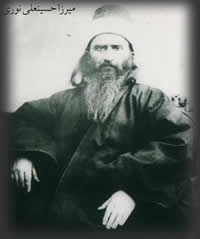 |
Baha’u’llah |
The founder of the Baha’i faith—known by the title of Baha’u’llah, ‘Glory of God’—was Mirza Husayn ‘Ali. The eldest son of a wealthy Persian family, he was born in Tehran on 12 November 1817 CE, two years before Mirza ‘Ali Muhammad, the man who would proclaim himself the gateway (‘Bab’) to the hidden Iman prophesied in Shi’ite belief.
Baha’u’llah’s early life reflected his well-to-do circumstances and he received the education typical of a child of the nobility, i.e. he was taught riding, calligraphy, and Arabic. In his youth he was known as the “father of the poor” for his many deeds of kindness. His wisdom and spiritual insight were also often remarked; it was said that he could resolve problems that stumped others, and that his knowledge of the Qu’ran and the hadith—Islamic traditions—astounded many of the learned. Although passionately interested in social justice, he turned down offers to serve in the government, choosing not to follow in his father’s footsteps and enter the political arena.
When the Bab declared his mission in 1844 CE, Baha’u’llah was 27 years old. Although he never met Mirza ‘Ali Muhammad, he became one of his foremost followers, suffering a brief imprisonment as a result. After the Bab was executed in 1850 CE, Baha’u’llah himself was imprisoned on false charges. His property was confiscated, and he was released only to be exiled to Baghdad.
Baha’u’llah’s revelation, which came to him in the prison in Tehran, would be publicly declared ten years later as he was preparing for a second exile to Constantinople. Forced transfers to Adrianople and finally to the prison-city of Akka in Palestine subsequently followed. Throughout these 40 years of imprisonment and exile, Baha’u’llah would be beset by enemies in the government, the clergy and even within his own family and there would be several attempts on his life. Yet through it all, he remained a person of deep spiritual insight and wisdom, dedicated to justice and integrity.
Baha’is mark the anniversary of the birth of Baha’u’llah with readings from the Bible, Qu’ran, or Bhagavad Gita, along with food and music reflecting local customs, an eclecticism that fits a religion incorporating the teachings of many spiritual traditions and attracting followers throughout the world.